Udzielamy informacji o programach pomocowych realizowanych przez PARP.

UN procurement
![]() According to the Annual Statistical Report on United Nations Procurement for 2013 the total value of goods and services ordered by the UN in 2013 increased to USD 16.1 billion compared to USD 15.4 billion in 2012.
According to the Annual Statistical Report on United Nations Procurement for 2013 the total value of goods and services ordered by the UN in 2013 increased to USD 16.1 billion compared to USD 15.4 billion in 2012.
We kindly invite you to make inquires about the information about the United Nations system, the UN public procurement rules, the position of Poland int he UN, as well as instructions for registration in the UN procurement database - United Nations Global Marketplace (UNGM).
The United Nations (UN) was established in 1945 as an initiative of 51 countries that began their activity on the international scale aimed at keeping peace and security in the world. Currently, the UN brings together 193 countries. It is headed by a Secretary General and since January 2007 this function has been performed by Ban Ki-moon.
UN’s main objectives are, among others:
- keeping international peace and security,
- settling specific international conflicts or problems, including: economic and humanitarian,
- undertaking measures for the broadly understood development (economic, social and health) as well as improving the living standards.
From the institutional perspective, the UN system is formed by nearly 40 entities, including:
- The United Nations (UN) with its seat in New York (the main office) and regional offices in Geneva, Vienna and Nairobi;
- 16 separate, specialized Agencies, including: WHO, ICAO, UNESCO, UNIDO, FAO, IAEA;
- 11 special programmes and funds, including: UNDP, UNHCR;
- 5 regional economic and social commissions for Europe (with the seat in Geneva), for Africa (in Addis Abeba, Ethiopia), Asia-Pacific (in Bangkok, Thailand), Latin America and the Caribbeans (in Santiago de Chile) and the Western Asia (in Beirut, Lebanon);
- 4 regional development banks for Africa, Asia, the Caribbeans and Latin America.
Moreover, other popular organizations related to the UN activity include:
- International Atomic Energy Agency (IAEA),
- World Trade Organization (WTO).
Poland, as a member of the United Nations, acts for the fulfilment of objectives and rules of the United Nations Charter.
![]() United Nations Charter is available here
United Nations Charter is available here
Poland signed the United Nations Charter on 15 October 1945 and the Charter was ratified on 16 October 1945. In a relevant statement the Polish government confirmed its support for the execution of the United Nations mission and expressed readiness to cooperate in the framework of the emerging collective security system, inviolability of state borders and embedding state systems on democratic principles.
Polish Representations to the United Nations function in Geneva, Nairobi, New York, Paris, Rome and Vienna.
Addresses of Representations’ official websites and basic contact data are presented below:
- Permanent Representation of the Republic of Poland to the Office of United Nations in Geneva (Switzerland) – webiste, contact data
- Embassy of the Republic of Poland in Nairobi (Kenya, Africa) - website, contact data
- Permanent Representation of the Republic of Poland to the United Nations in New York (the US) - website, contact data
- Permanent Representation of the Republic of Poland to UNESCO in Paris (France) - website, contact data
- Embassy of the Republic of Poland in Rome (Italy) - website, contact data
- Permanent Representation of the Republic of Poland to the Office of the United Nations and International Organizations in Vienna (Austria) - website, contact data
Useful websites:
Ministry of foreign affairs RP - more information on Polish participation in international organizations (including: UN) here
The UN’s demand for goods, services and construction works
In order to execute the United Nations mission, particular units of the UN system implement programmes and projects and undertake a number of activities that require various types of goods and services. Procurements for goods, services and construction works are executed through contracts with suppliers selected following the public procurement procedure.
![]() The UN body responsible for the organization of tenders for particular units, offices and departments as well as representations to the UN is UN Secretariat.
The UN body responsible for the organization of tenders for particular units, offices and departments as well as representations to the UN is UN Secretariat.
The UN public procurement market in numbers
The total value of goods and services ordered every year within the framework of the United Nations System is presented in the form of an , available on the United Nations Global Marketplace (hereinafter: UN Statistical Report for 2013).
![]() According to the report for 2013, available for download at here the total value of goods and services ordered by the UN in 2013 increased to USD 16.1 billion compared to USD 15.4 billion in 2012.
According to the report for 2013, available for download at here the total value of goods and services ordered by the UN in 2013 increased to USD 16.1 billion compared to USD 15.4 billion in 2012.
![]() The chart below, which is an excerpt from the 2013 report, presents the total value of goods and services ordered by the UN in the years 2009-2013:
The chart below, which is an excerpt from the 2013 report, presents the total value of goods and services ordered by the UN in the years 2009-2013:
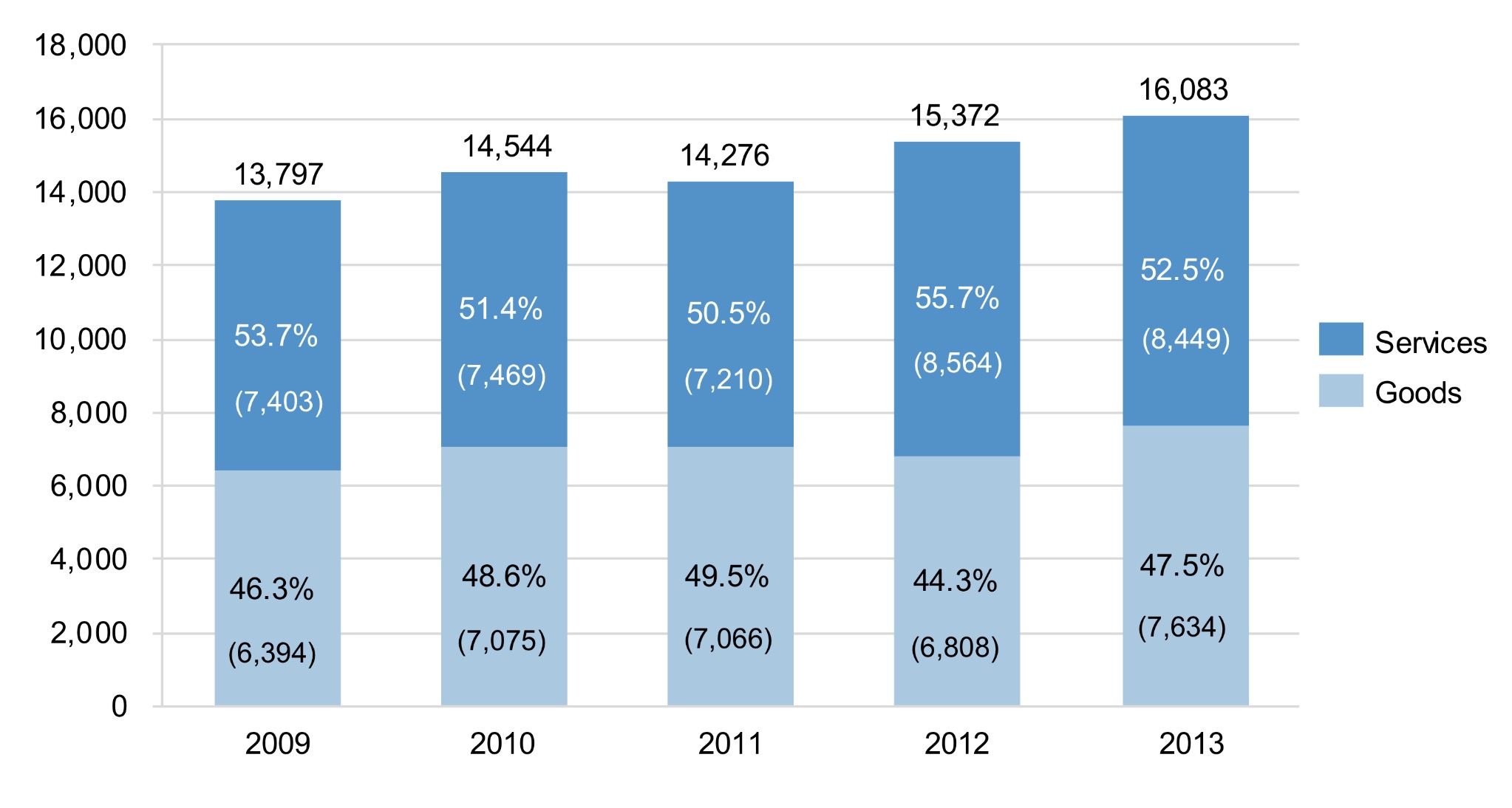
The value of the UN public procurement market in the years 2009-2013 (expressed in USD billion)
![]() Therefore, it is worth to point out that the value of services ordered in 2013 amounted to USD 8.449 billion. We can see that it observed a decline compared to 2012 from USD 8.564 billion. The value of goods ordered in 2013 amounted to USD 7.634 billion, so it observed an increase compared to 2012 when the value amounted to USD 6.808 billion.
Therefore, it is worth to point out that the value of services ordered in 2013 amounted to USD 8.449 billion. We can see that it observed a decline compared to 2012 from USD 8.564 billion. The value of goods ordered in 2013 amounted to USD 7.634 billion, so it observed an increase compared to 2012 when the value amounted to USD 6.808 billion.
According to the UN Report for 2013, an increase in the overall number of orders results mainly from an increase in orders executed by:
- FAO (Food and Agricultural Organization of the United Nations);
- UNHCR (the United Nations High Commissioner for Refugees);
- UNICEF (the United Nations Children's Fund) and
- UN/PD (the United Nations Procurement Division).
The increase in the overall number of orders made by the above mentioned organizations results mainly from an increase in the demand for, among others, medical equipment, medications, administration and management services. Since 2008, the UN’s demand for services has demonstrated higher figures than the demand for goods. In 2013, despite the increase in the number of orders for goods, the services still constituted the majority of orders in the UN system – over 50% of all executed orders.
In 2013 the United Nations ordered goods and services from 192 countries, out of which the annual value of contracts in 123 countries exceeded USD 10 billion.
Given the categories of ordered goods and services, according to the UN Report for 2013, the great demand of the UN system covers plenty of sectors, reflecting the demand of particular organizations and agencies functioning within the UN.
The chart excerpted from the UN Report for 2013 presents sectors in which the number of goods and services was the largest:
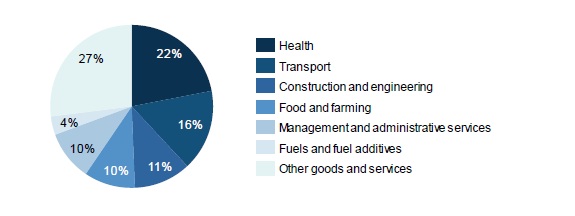
Thus, the sectors displaying the largest number of orders are: the health sector (demand for: medications, medical services, medical and laboratory equipment) and the transport sector (demand for: transport services and means of transport). In 2013 contracts in the health sector constituted 22% of all UN contracts, while contracts in the transport sector amounted to 16%.
According to the chart, in 2013 the next three significant sectors were:
- engineering and construction works;
- food and agriculture;
- management, consulting and administration services.
Polish entrepreneurs successfully participate in global public tenders, including tenders organized by various UN agencies. According to the UN Report for 2013, the total share of Polish companies in UN contracts for goods and services amounted to USD 2.4 billion, which constitutes 0.02% of all contracts executed by the United Nations in 2013.
Tendencies concerning UN public contracts executed by Polish companies in 2013 are presented in the chart below:
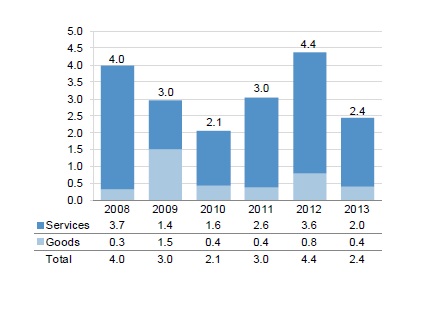
The UN public procurement in Poland (values expressed in USD billion)
![]() The execution of contracts by Polish entrepreneurs for particular UN agencies in 2013 is presented below:
The execution of contracts by Polish entrepreneurs for particular UN agencies in 2013 is presented below:
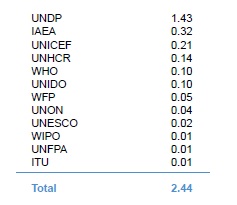
Contracts of Polish companies executed for the UN agencies in 2013 (values expressed in USD billion)
It is worth to note that in 2013 the majority of the above mentioned contracts were executed for the following organizations:
- United Nations Development Programme, UNDP – value of contracts: USD 1.43 billion;
- International Atomic Energy Agency, IAEA – value of contracts: USD 0.32 billion;
- the United Nations Children's Fund, UNICEF – value of contracts: USD 0,21 billion.
According to the UN Report for 2013, the executed contracts mainly concerned:
- in the field of goods: medications and laboratory equipment,
- in the field of services: administration and engineering services.
The United Nations procurement market is open to companies from the entire world, including Polish entrepreneurs. Goods and services are ordered from many industries.
Registration in the UNGM base
![]() The first step to participate in the UN public procurement market should include a registration of an entrepreneur in the United Nations Global Marketplace (UNGM): http://www.ungm.org. The registration in UNGM provides access to information and allows participation in tenders organized by the UN system.
The first step to participate in the UN public procurement market should include a registration of an entrepreneur in the United Nations Global Marketplace (UNGM): http://www.ungm.org. The registration in UNGM provides access to information and allows participation in tenders organized by the UN system.
It is possible to register at 3 levels in the UNGM base – basic (via entering basic company data) as well as I and II (more detailed data concerning the company are required at the registration stage).
BASIC level
Requirements:
1) registration of basic data (company, contact data, contact persons’ data, other);
2) indication of country/countries where the business activity is conducted;
3) classification of goods and services offered.
Level I
Requirements:
4) meeting the requirements specified in items 1 - 3;
5) presentation of a document confirming the legal form of an enterprise (in the case of Polish entrepreneurs conducting business activity in the form of commercial law companies, a copy from the National Court Register needs to be submitted);
6) indication of contact data of at least three independent, unrelated entities providing references to an entrepreneur wishing to register their activity in the UNGM base. References should reflect the fact of business cooperation between entities;
7) indication of data of owners and a company’s management structure (plus, among others, related entities, branches, representations, managing directors) and data of consultants and intermediaries cooperating with an entrepreneur in the scope of contracts, agreements and tenders within the framework of the UN system.
Level II
Requirements:
8) meeting the requirements specified in items 1 - 7;
9) presentation of letters of reference from three independent, unrelated clients or companies; references should reflect the fact of business cooperation between the entities. Other requirements concerning letters of reference:
- letters of reference should be drawn up in English,
- they should be written by three independent entities to whom an entity to be registered sold goods or provided services in the last 12 months,
- a letter of reference preferably includes a description of cooperation (i.e. subject, start and end date, project value),
- letters should be drawn up on an official paper of a reference provider and should closely refer to the entity to which the reference is provided;
10) production of an annual account (after the financial audit or other certification procedure) or an equivalent document from the last three years.
![]() 3 core information about UNGM:
3 core information about UNGM:
- the base is available for free in English, French and Spanish;
- registration takes place exclusively online, by means of one form on the UNGM registration web page;
- registration at the basic level takes up ca. 5 – 10 minutes.
Classification of goods and services
Goods and services ordered by UN agencies are harmonized through a consolidated classification of the United Nations Supplier Code of Conduct (UNSPSC). The classification is available on UNGM website: https://www.ungm.org/Public/UNSPSC and below:
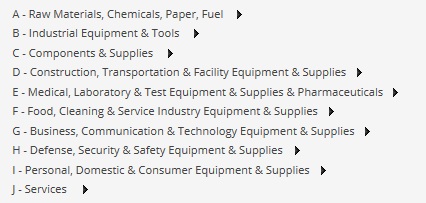
The code tabs expand into specific codes, see an example below (for codes in the food sector):
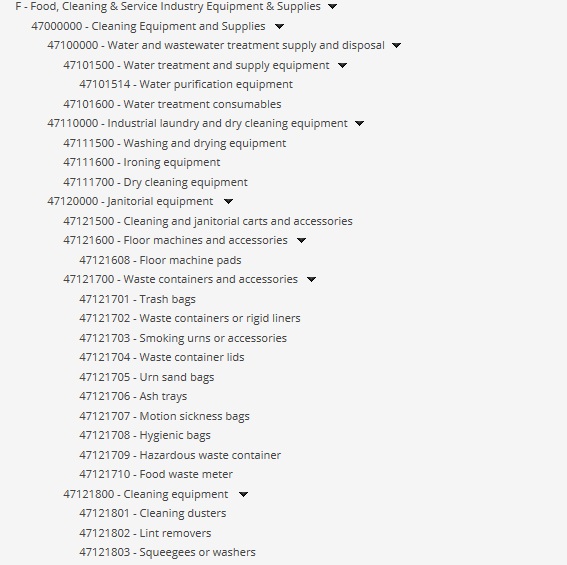
How to properly determine a code for a good or service?
You need to select a code that is most detailed for a given good or service, i.e. located lower in the presented code hierarchy. For example: instead of a general code 47000000, in accordance with the abovementioned expansion of codes in the food sector, you need to select a specific code, e.g. 47101514.
The UN recommends to choose codes at least 3 layers below the general code. Further, you need to choose all possible codes that classify a good or service to be sure that the classification has been exhaustive.
Automatic business matching
Through registration in the UNGM base, entrepreneurs are automatically matched with organizations within the UN system that order goods and services corresponding to registered companies’ fields of activity. After the registration process it is possible to turn off contract notices sent by particular agencies, respecting the entrepreneur's will. However, it is not possible to receive contract notices sent by agencies that do not order goods and services in the entrepreneur's field of activity.
Post-registration stage
After the completion and approval of the registration form by an entrepreneur, they have the right to alter or remove the registered data.The process of updating takes up to 10 working days. The entrepreneur’s profile that has been matched with at least 1 UN organization or agency in the process is visible to UN workers. This means that the profile is active in the UNGM base.
Further, the UN automatically receives information on the registration of a new entrepreneur in the system. The registration form of an entrepreneur is examined only at the basic level, that is, as regards: basic data (company, contact data, contact persons’ data, other); country/countries where business activity is conducted and classifications of goods and services offered by an entrepreneur. Verification of the form by the UN takes up to 10 working days. Throughout this period an entrepreneur cannot alter the data entered into the form.
Verification of registration forms at the I and II level takes place solely as part of the tender procedure. In this case, the entrepreneur’s application shows the "submitted”status in the UNGM system.
Assistance in the registration of a company profile in UNGM
In case of problems with registration you need to choose a “Help” option: https://www.ungm.org/Vendor/Registration. It contains most frequently asked questions or you can ask a question directly to a consultant (a reply may take up to 48 hours).
Information on current tenders
![]() After the registration and activation of an account it is advised to follow the information on current tenders, available on UNGM web page under the “Business opportunities" tab: https://www.ungm.org/Public/Notice
After the registration and activation of an account it is advised to follow the information on current tenders, available on UNGM web page under the “Business opportunities" tab: https://www.ungm.org/Public/Notice
The tender database is free of charge and contains complete information about UN tenders.
Food and Agriculture Organization of the United Nations (FAO) is the leading UN agency in the food and agriculture sector. FAO acts for the development of agriculture and food safety, from the presentation of new technologies to providing advice on how to achieve high and durable quality in the international trade in agricultural products. FAO performs activities and executes projects aimed at reducing global poverty and hunger.
On behalf of FAO orders are executed by the Procurement Department with an office in Rome (Italy).
![]() More information on FAO here
More information on FAO here
The most frequently ordered goods include:
- basic chemicals (fertilizers and pesticides),
- agricultural products (seeds, crops, vegetables, seedlings),
- special purpose machines (agricultural machines, tractors, spraying devices, watering devices),
- transport equipment,
- office and IT equipment,
- medical and laboratory equipment,
- veterinary pharmaceutical products and vaccines,
- grain, starch and processed starch milling products (fish food, feedingstuffs for cattle and poultry),
- chemical products, fibers and plastics, rubbers,
- live animals and animal products,
- machines and equipment (including small agricultural tools, hoes, pickaxes, etc.).
The most frequently ordered services include:
- architecture, construction, technical and engineering services,
- trade services,
- polls and research,
- insurances,
- training courses,
- storage,
- transport and communication,
- IT services.

